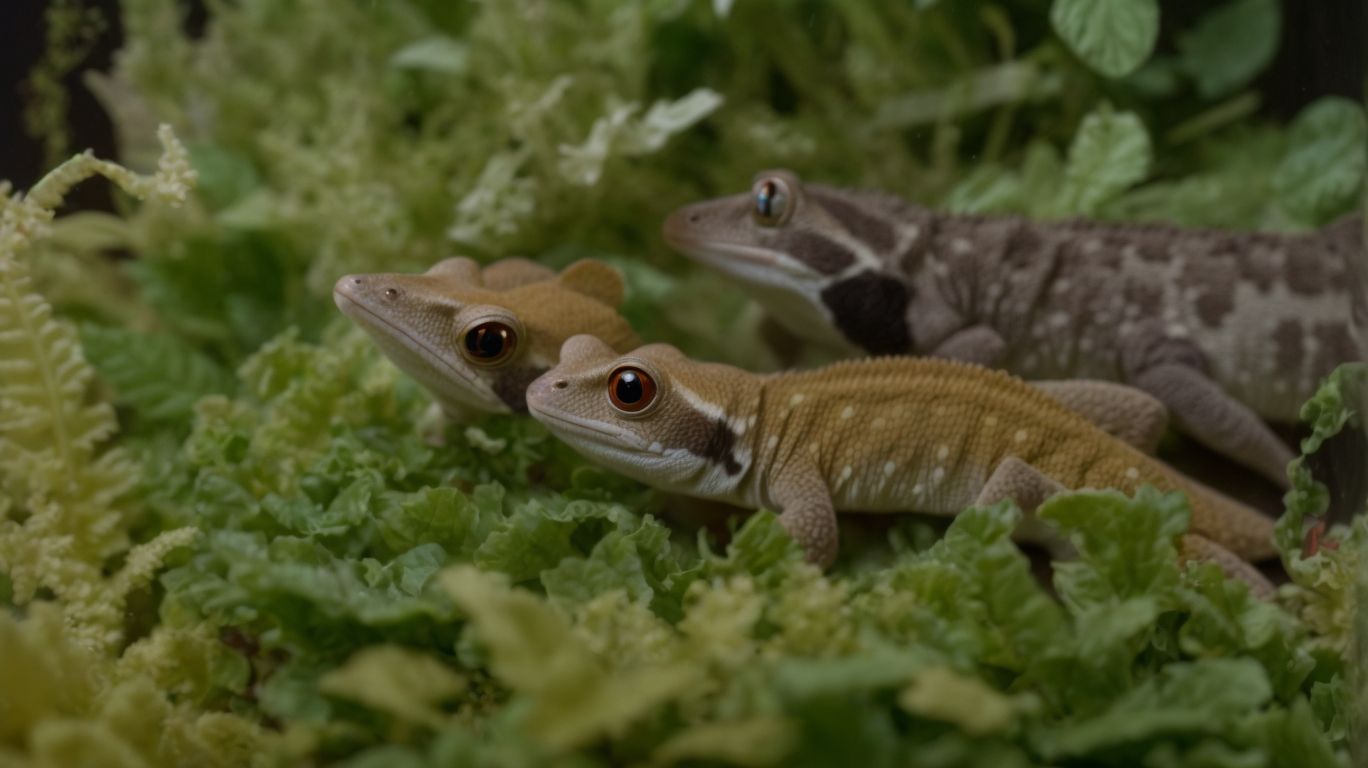
Red Crested Gecko Health: Common Issues and Preventive Care
Are you a proud owner of a red crested gecko? These beautiful, vibrant creatures make wonderful pets, but like all animals, they can be susceptible to health issues.
In this article, we will explore the common health problems that red crested geckos may face, such as Metabolic Bone Disease, Mouth Rot, Parasites, and Respiratory Infections. We will also discuss how to prevent these issues by providing a proper diet, maintaining the right humidity and temperature, keeping their enclosure clean, and scheduling regular veterinary check-ups.
We will provide guidance on what to do if your gecko shows signs of illness and how to handle a sick gecko with care and compassion. Whether you’re a new owner or a seasoned reptile enthusiast, this article will offer valuable insights into ensuring the health and well-being of your red crested gecko.
What is a Red Crested Gecko?
The Red Crested Gecko, a popular reptile pet, is known for its stunning appearance and unique characteristics. As a reptile enthusiast, understanding the nature and care requirements of this species is essential for providing it with a healthy and fulfilling life.
These geckos are distinguished by their vibrant red coloration and crest-like structure on their heads, which adds to their allure. Their large, lidless eyes and adhesive toe pads make them exceptional climbers.
In their natural habitat, they are nocturnal and arboreal, often seeking refuge in tree hollows. When kept as pets, it’s crucial to recreate this environment in their terrariums, providing ample climbing opportunities and cozy hiding spots.
A diet of calcium-dusted insects, fruit puree, and specialized gecko food ensures their nutritional needs are met.
What are the Common Health Issues for Red Crested Geckos?
The health of Red Crested Geckos can be affected by various common issues, including diseases, symptoms, and parasitic infections. Recognizing and addressing these health concerns is crucial for ensuring the well-being of these captivating reptile pets.
Metabolic Bone Disease (MBD)
Metabolic Bone Disease (MBD) is a significant health concern for Red Crested Geckos, impacting their skeletal structure and overall well-being due to calcium and vitamin deficiencies. Proper calcium supplementation and environmental enrichment are crucial in preventing and managing this condition.
Red Crested Geckos are at a higher risk of developing MBD without sufficient calcium intake and exposure to UVB lighting. MBD can lead to weakened bones, deformities, and paralysis. It’s crucial to create a well-balanced habitat that includes appropriate UVB lighting, a calcium-rich diet, and regular access to supplements to support their bone health.
In addition, maintaining ideal environmental conditions, such as proper humidity levels and suitable temperature gradients, is essential in preventing MBD. By providing these necessary elements, you can ensure the overall health and well-being of your Red Crested Gecko.
Mouth Rot
Mouth rot, a bacterial infection affecting the oral health of Red Crested Geckos, can lead to severe discomfort and complications. Maintaining proper oral hygiene and seeking timely veterinary care are essential in preventing and addressing this condition.
Regularly inspecting the gecko’s mouth for any signs of inflammation, redness, or discharge is crucial to catch the onset of mouth rot early.
Ensuring a clean and suitable habitat, providing a balanced diet, and avoiding stressors are additional measures to reduce the risk of bacterial infections.
Implementing these preventive measures and promptly addressing any oral health concerns can significantly improve the overall well-being of Red Crested Geckos.
Parasites
Parasitic infestations, both external and internal, pose a significant threat to the health of Red Crested Geckos, affecting their digestive and immune systems. Implementing preventive measures and regular parasite screenings are vital for safeguarding their well-being.
Parasitic infestations can cause a range of symptoms in geckos, including decreased appetite, weight loss, lethargy, and skin irritation.
These parasites, both internal (like nematodes and coccidia) and external (like mites and ticks), can have serious consequences for the gecko’s overall health and vitality. Weakness of the immune system and secondary infections are common results.
It’s important to consult a reptile veterinarian for proper diagnosis and treatment to ensure the gecko’s long-term well-being. Additionally, maintaining a clean habitat and practicing good hygiene can help reduce the risk of parasitic infestations.
Respiratory Infections
Respiratory infections can afflict Red Crested Geckos, particularly when environmental conditions such as humidity and temperature are not optimal. Maintaining appropriate habitat parameters and prompt medical attention are vital in preventing and managing these infections.
Geckos are prone to respiratory infections when they are kept in environments with insufficient humidity or inconsistent temperatures. Poor ventilation and exposure to stressors can also weaken their respiratory health. As responsible owners, it’s important to regularly monitor and adjust these conditions and seek veterinary care immediately if any respiratory distress is observed.
Furthermore, it’s crucial to maintain strict hygiene practices and implement disease prevention protocols to protect the health of these unique reptiles.
How to Prevent Health Issues in Red Crested Geckos?
Preventing health issues in Red Crested Geckos involves attentive care and a focus on elements such as diet, habitat, temperature, and humidity. Implementing proper preventive measures is essential for maintaining the well-being of these captivating reptile pets.
Provide a Proper Diet
Offering a proper diet that fulfills the nutritional needs of Red Crested Geckos, including hydration and essential supplements, is vital for maintaining their health and vitality.
Balancing their dietary requirements is crucial in preventing various health issues. Maintaining a diet rich in variety is key in preventing nutritional deficiencies. Red Crested Geckos thrive on a diet consisting of insects, fruits, and commercially-prepared powdered diets, which should be appropriately supplemented with calcium and vitamin D3 to support bone health and prevent metabolic bone disease.
Ensuring proper oral health, they also benefit from clean drinking water and occasional misting to maintain hydration and aid in shedding. These considerations play a significant role in promoting the overall well-being of Red Crested Geckos.
Maintain Proper Humidity and Temperature
Maintaining appropriate levels of humidity and temperature within the gecko’s habitat, along with adequate UVB lighting, is crucial for their physiological well-being and overall health.
Creating a suitable microclimate is essential in preventing potential health issues.
To properly care for geckos, it is crucial to maintain humidity levels between 60-70% and a temperature range of 75-85°F, mimicking their natural habitat.
UVB lighting is also essential for geckos as it aids in the synthesis of vitamin D3, which is crucial for calcium metabolism.
Creating a microclimate that includes warm and cool areas allows geckos to regulate their body temperature, promoting natural behaviors and overall comfort.
Keep the Enclosure Clean
Ensuring cleanliness and hygiene within the gecko’s enclosure, coupled with environmental enrichment, is essential for preventing the proliferation of disease-causing pathogens and maintaining their overall health.
Regular cleaning routines are vital in safeguarding their well-being. This includes removing feces and uneaten food, as these can harbor harmful bacteria and parasites.
Providing a naturalistic environment with enriching elements such as climbing structures, hiding spots, and live plants not only stimulates their natural behaviors but also reduces stress.
Maintaining optimal humidity and temperature levels is also crucial for their physiological well-being and disease prevention.
By adhering to these hygiene practices and environmental enrichment, gecko owners can create a safe and enriching habitat for their beloved pets.
Regular Veterinary Check-ups
Regular veterinary check-ups, attentive medical attention, and stress management, including quarantine when necessary, are vital components of preventive care for Red Crested Geckos.
Proactive veterinary care is essential for early detection and management of potential health issues.
Regular check-ups are essential for maintaining the health of your gecko. During these appointments, the veterinarian will assess your gecko’s overall well-being, address any specific concerns, and provide guidance on proper nutrition and habitat maintenance.
Stress management is also crucial for keeping your gecko healthy. This can include providing a secure and enriching environment to minimize the impact of environmental stressors. Additionally, implementing quarantine protocols can help prevent the spread of communicable diseases and ensure the well-being of your entire gecko population.
What Should I Do If My Red Crested Gecko Shows Signs of Illness?
If your Red Crested Gecko exhibits signs of illness such as behavior changes or specific symptoms, seeking prompt medical attention from a qualified reptile veterinarian is crucial. Timely intervention is essential in addressing their health concerns effectively.
Noticing any sudden or drastic changes in your gecko’s eating habits, activity levels, or appearance could indicate an underlying health issue. Symptoms like weight loss, lethargy, or skin abnormalities should not be overlooked.
A reptile veterinarian can conduct thorough examinations and recommend appropriate treatment to ensure the well-being of your beloved pet.
How to Handle a Sick Red Crested Gecko?
Handling a sick Red Crested Gecko involves isolation, creating a comfortable environment, administering prescribed medication, and maintaining ongoing preventive care. Providing attentive support during their recovery process is vital for their well-being.
Isolating the sick gecko in a quiet, warm, and stress-free environment is crucial to prevent further spread of illness and aid in their recovery. Ensuring their enclosure is well-maintained with proper temperature, humidity, and nutrition supports their healing process.
Administering medication as prescribed by a reptile veterinarian is essential, taking care to follow dosage instructions and monitor for any adverse reactions. Maintaining regular hygiene and preventive care practices for the gecko, such as routine cleaning, proper hydration, and balanced nutrition, is essential to promote their overall well-being during this time.
Isolate the Gecko
Isolating the sick Red Crested Gecko from other animals and providing a designated quarantine area is essential for preventing the spread of potential contagions and facilitating their recovery process.
Creating a stress-free environment is crucial during their recuperation.
This isolation not only helps to contain the illness but also reduces the risk of infecting other geckos within the habitat.
A designated quarantine area allows for more focused care and observation, ensuring that the sick gecko receives the attention it needs.
In this stress-free environment, the gecko can recover without the added pressure of interaction or competition for resources, which can significantly aid in its recuperation.
It’s important to consider the environmental conditions, such as temperature and humidity, to ensure a suitable habitat that promotes healing and minimizes stress during the recovery process.
Provide a Comfortable Environment
Creating a comfortable and supportive environment for the sick Red Crested Gecko, encompassing appropriate temperature, humidity, and hide areas, is essential for promoting their recovery and well-being. Attentive environmental management is crucial during their convalescence.
This means maintaining a stable and suitable temperature range, typically around 78-82°F in the daytime and a slight drop at night. Ensuring the humidity levels stay between 60-70% is vital, as it supports their respiratory function and hydration.
Providing adequate hide areas enables the gecko to feel secure and reduce stress, aiding in their overall healing process. By carefully addressing these elements, we can create an optimal environment for the sick Red Crested Gecko’s rehabilitation.
Administer Medication as Prescribed by a Veterinarian
Administering prescribed medication as directed by a qualified reptile veterinarian is crucial for addressing the specific health concerns and facilitating the recovery of a sick Red Crested Gecko.
Adherence to veterinary guidance is essential for their well-being. Following the prescribed medication regimen ensures that the gecko receives the necessary treatment to combat infections and restore its health.
Professional guidance helps in monitoring the gecko’s progress, making timely adjustments to the medication as needed.
It is important to recognize that deviations from the prescribed medication or dosage can hinder the gecko’s recovery process, underscoring the importance of strict adherence to the veterinarian’s instructions.
Monitor and Continue Preventive Care
Continuously monitoring the health status of the sick Red Crested Gecko and adhering to ongoing preventive care measures, alongside prompt medical attention when needed, is essential for facilitating their recovery and overall well-being. Vigilance and proactive care are vital during their recuperation.
This continuous vigilance allows for early detection of any potential health issues, enabling prompt intervention before they escalate. Regular check-ups and ongoing medical attention ensure that any underlying conditions are promptly addressed, preventing further complications.
Incorporating proactive measures, such as providing a suitable habitat and balanced diet, plays a significant role in supporting their immune system and aiding their recovery process. Consistent monitoring and preventive care ultimately contribute to the long-term health and well-being of sick Red Crested Geckos.




No Comments